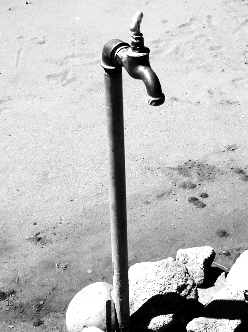Katherine keeping PFAS restraints
 Water restrictions in Katherine will stay for several more years, with progress on a solution to PFAS contamination still a long way off.
Water restrictions in Katherine will stay for several more years, with progress on a solution to PFAS contamination still a long way off.
Restrictions were imposed in late 2017 after the potentially toxic chemicals were found in the town's bore water.
They include limits on watering lawns and a ban on watering hard surfaces.
The town's water supply is safe to drink, but the restrictions are needed to limit the amount of contaminated bore water added to supplies during the dry season.
Katherine water services general manager Rob Brito says a new water source for the town is needed before the restrictions can be lifted.
Proposed fixes include expanding an existing treatment plant for groundwater sources, which was supplied by the Defence Department to remove PFAS from Katherine's groundwater but only treats up to 1 million litres of water a day.
Power and Water says an entirely new source of water would help too, but carries the risk of drawing up PFAS in the future.
“We've looked at alternative groundwater sources, at a different, a number of locations,” Mr Brito said.
“There are risks that any groundwater source today may be not have any PFAS whatsoever, but a few years down the track you may end up detecting or drawing through PFAS.
“Hence we believe a treatment solution provides certainty now and into the future.”
He said that expanding the expansion treatment plant would take up to two years to be completed.
“Providing a new safe water source to a community is complex,” Mr Brito said.
“We absolutely want to get the right solution in place, and we want to get the right solution at the right time.”
Katherine residents have been offered free blood tests for people who live or work, or have lived or worked, in the RAAF Base Tindal investigation area – where the chemicals were used in the late 1990s and early 2000s as part of firefighting operations.








 Print
Print